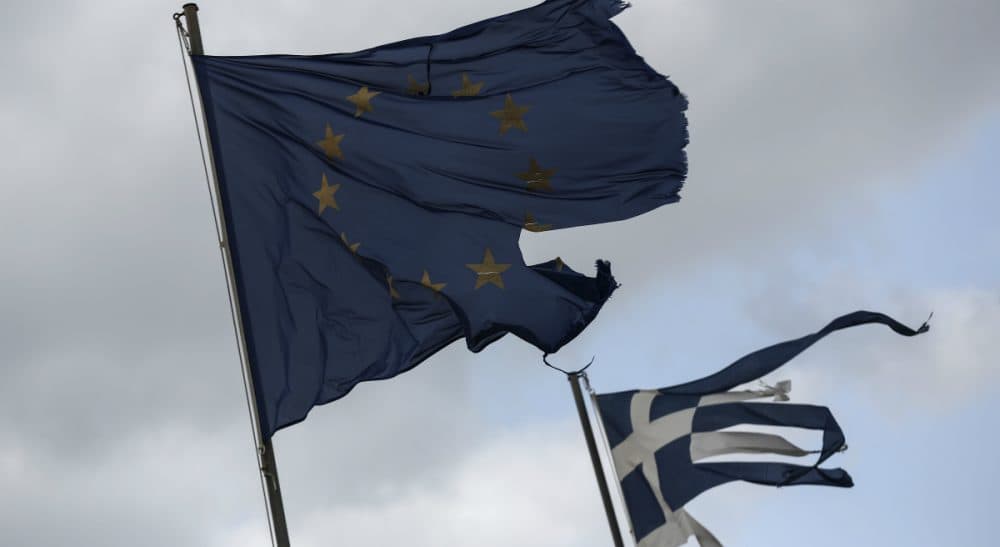Advertisement
In Tatters: Greece’s Economic Meltdown And The State Of Democracy In Europe

Given this week’s standoff between Germany and Greece, it is worth remembering that a quarter century ago, the great crisis facing Europe also involved the question of what to do about Germany and her relationship to her neighbors.
At the heart of the matter was whether a reunified Germany should be allowed to join a regional cooperative group—NATO. In a quietly arranged quid pro quo, France ultimately dropped its objections in return for Germany’s support for the future creation of a common, unified European currency. How that decision became a reality suggests that today’s crisis has far less to do with economics in Greece than the Euro’s erosion of democracy in Europe.
...it is worth remembering that a quarter century ago, the great crisis facing Europe also involved the question of what to do about Germany.
Greece is only the latest in a string of examples suggesting that many of Europe’s problems from a generation ago continue to persist today. Efforts by European states to strengthen economic, democratic and security ties at the end of the Cold War have steadily broken down, and, in their wake, it has become clear that easy agreements were made when difficult decisions were needed. Many of those choices were economically expedient, including the creation of the Eurozone, and they favored the central and northern European powers.
In a major letter earlier this week , a handful of the world’s leading economists urged German Chancellor Angela Merkel to reach an agreement with Greece to avoid a catastrophe. Among the few options available, Germany and the other creditors can write off Greece’s debts or agree to a more lenient payment package, but if neither side gives in, then Greece will exit the euro. While the economists’ letter correctly addresses the immediate crisis, it does not confront the wider issue that the current Eurozone system is politically unviable.
The instability of the Eurozone is made patently clear by the structure of the bailout that was provided for Greece. A so-called troika of lenders financed the effort, including the European Central Bank, the International Monetary Fund and the European Union. Despite the fact that Germany is only one member of these organizations, the current system allows them to hold up approval for a reform package they do not like, even if the other members support its approval. In effect, Greece will only get relief if Chancellor Merkel has the support of her legislature in Germany. The only other option is to blast apart the ties between the creditors, with equally disastrous consequences.
Given the situation, the fact that Greek voters took to the polls on Sunday and voted to reject more austerity measures means little. Instead, the representatives of voters in another country effectively hold the fate of their nation in their hands.
For the Greeks, participation in the Eurozone has come at the expense of their right as a people to exercise democracy in order to determine their own economic security.
It is all-too easy to make references to the economic decisions made by European powers at the end of World War I, or the success of debt forgiveness for Germany after World War II. It is more important though, to return to the events that led to the reunification of Germany. It was, after all, a truly democratic act that led to the demise of communism in East Germany. Politicians responded admirably to the charge that leaders must enshrine the will of the people in ways that safeguard human dignity, including economic rights, but they did so after the people made their wishes clear. The euro exists not because leaders decided to reunify Germany, but because people living in East Germany under the rule of a foreign power took to the streets.
Leaders seized on that moment to implement a broad vision, yet some of those choices have delivered a cruel reality for the Greeks and an unenviable position for Chancellor Merkel. Her government controls the future of another people, and it is unlikely that this will work. For the Greeks, participation in the Eurozone has come at the expense of their right as a people to exercise democracy in order to determine their own economic security. The structure of this arrangement leaves little but the worst options for either to choose from and encourages brinksmanship of a kind that has become increasingly frequent. Unless the structure of the Eurozone is changed, similar crises will tend in the same direction, and if that is the case, the question arises: What is a government for?
